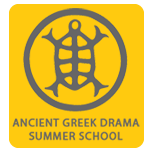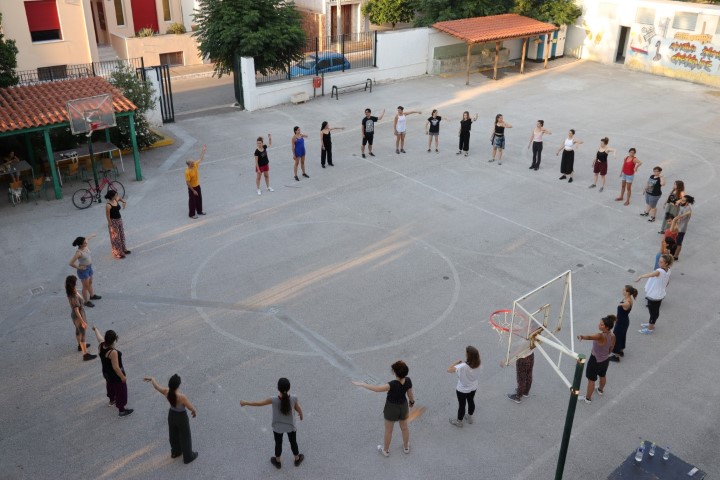ANCIENT GREEK DRAMA SUMMER SCHOOL 2019
ATTIKO INTERNATIONAL ANCIENT GREEK DRAMA SUMMER SCHOOL
When: July 1-10, 2019
Where: Elefsina
Welcome to the 7th Attiko International Summer School of Ancient Greek Drama!
The Summer School will take place from the 1st to the 10th of July at the Old Oil Mill of Elefsis, situated about 18 km northwest from the centre of Athens. The program of the 7th Summer School will focus on the work of the great tragic poet, Euripides.
We, the coordinators as well as the participants of the Attiko International Summer School are delighted to announce the participation of our school in the newly established International Network of Ancient Greek Drama by the Ministry of Culture. Our participation in this network comes as a reward for the tireless endeavours of the professors, students and volunteers of the Attiko School for the furtherance and research on ancient Greek drama and marks the beginning of a new era on the study of ancient Greek texts as well as their interpretation in theatre.
The institutions, which participate in the International Network including educational programs and artistic projects for the furtherance of ancient Greek drama and its importance under a 3-year programme agreement with the Ministry of Culture, are the following: the National Theatre of Greece (in cooperation with European Cultural Centre of Delphi), the National Theatre of Northern Greece, the Athens and Epidaurus Festival with the Epidaurus Lyceum and the Attiko International School of Ancient Greek Drama of Elefsis.
From 2017 the Attiko International School is integrated into the Elefsis 2021- European Capital of Culture action framework.
Our intensive summer school program, conducted by professors from Greece and abroad, will host 50 students. Furthermore, our theatre company will present in August 2018 the tragedy Prometheus Bound in a new translation, with the participation of many renowned actors.
The Summer School is open for everyone over the age of 18 with an interest in Ancient Greek Drama and its modern interpretation, and includes:
65 hours of classes
4 experimental performances of Greek tragedies
3 film screenings
3 hearings
1 perfomance / workshop
2 speeches/lectures
1 art exhibitions
1 music performance
1 educational trip
1 welcome lunch
1 farewell ceremony for awarding the certificates of attendance
WORKSHOPS 2019
MOVEMENT
MANUEL RONDA | Based on the working-methods of "2Halves"
When we begin tapping into the fundamental resources within each body, we start to re-discover our natural instinct in movement, movement which comes naturally, expressing a wide range of emotions and desires. Movement conceived as a necessity, as a theatrical act, rather than a form.
We will work to discover the many layers involved in partnerwork situations like depending on another body, trusting it, controlling and caring for it, giving and receiving impulses, how to approach an outside body.
Directing weight, learning how to make good use of it, going around it.
Being the shadow of one an other.
Being there.
Being there and weighing 100 tons.
Travelling without moving.
Fighting without fighting.
KONSTANDINA EFTHIMIADOU - "SHAKE OUT THE DUST"
We start with shaking, a repetitive pulsating movement of the vertical axe. We “dust out” the body and the mind from information and tensions which limit or block the movement’s flux, focusing on the present time.
Through guided improvisation, we discover our own qualities, we explore them, observe them, overthrow them, and subsequently we use them in choreographed moving phrases.We allow that, every moment, any given direction transforms our body’s movements instead of adjusting the direction to everything that our body is accustomed to or has learned to easily do. We approach the movement through the body’s ingenuity and not through a cerebral process which usually results in blocking the spontaneous expression of the body.
GEORGIA PAIZI - "Alexander Technique workshop"
The ALEXANDER TECHNIQUE is an indispensable toolkit to a dancer’s, a musician’s, a performer’s practice, that contributes to the understanding of one’s own body mechanics and movement patterns, cultivates kinesthetic intelligence, and offers coordination and efficiency in movement and stillness, while enriching one’s physical presence, performance skills and embodied awareness. Unconscious postural and movement habits that are commonly developed early through one’s education and later through one’s professional life, as well as the embodiment and physical expression of one’s character and emotions, interfere with the natural organization of the body, restricting performance, and causing misuse of energy, pain, discomfort and anxiety. In this workshop we will attempt to retune this organic balance of the body, retrieving the space the we own (once hight, depth, and width), reconnecting efficiency and the creative process of the emergence of movement and dancing.
Ida P. Rolf (Rolfing), Moshe Feldenkrais (Feldenkrais Method), Joan Skinner (Skinner Releasing Technique), Trisha Brown, Gill Clarke, and Pauline Oliveros (Deep Listening), are some of the most important people in the performing arts, dance and movement education that have mentioned some profound experiences through studying or even incorporating the Alexander Technique in their own practice.
ACTING
THEMIS PANOU "Agamemnon"
Approaching a role in Αncient Greek Tragedy.
AKYLLAS KARAZISIS “Finding One’s Voice”
Actor and Director Akyllas Karazisis works with participants to develop and explore their unique theatrical voice and perspective. Using Euripides’ texts as a foundation, Karazisis will lead participants in an interdisciplinary improvisational workshop, leading to the creation of devised theatercial work.
CAMILO BENTANCOR “Actor Ex Machina”
In this physical workshop, acrobat, dancer and choreographer Camilo Bentancor questions the idea of physical limitations in performance. Participants will take part in exercises of balance, breath and control, exploring what happens when the body is put into an extreme situation on stage.
MUSIC
ANDYS SKORDIS - Takendim...Rhythms and Polyrhythms
“‘Rhythm is without a doubt a big part of our lives. From the moment of creation, our heart beats and we are synchronised with something rhythmical that accompanies us until the ‘end’’”
In this workshop we will study rhythm using the polyrhythmic approach, meaning, the existence of two or more rhythms at the same time. In these lessons we will be taught ways to approach rhythm, through the techniques of Carnatic music (classical music of Northern India) and how to apply and create polyrhythms verbally, otherwise described as the method Konnakol. At the same time, we will learn how to develop these polyrhythms, but also how to understand and perform complex rhythmic structures. The workshop, therefore, introduces to its participants new rhythmic approaches, suggesting methods for the improvement of the sense of ‘pulse’ and development of rhythmical perception
VOCAL COACHING
MARINA SATTI
Borrowing from Bobby McFerrin's circle-singing seminars, this workshop will start by examining the exchange of musical idioms and influences. The focus will then lay on developing the musicality of the participants and on nurturing a creative social harmony in an circle constantly redefined by the culture of its members.
GREEK TRADITIONAL DANCES
ANDREAS SEGDITSAS
Traditional round and duet dances, mixed, for men only or for women only. Ritual dances, war dances, erotic dances, dances for feasts, weddings, dances for grief. Because anything that can't be said, can be danced.




